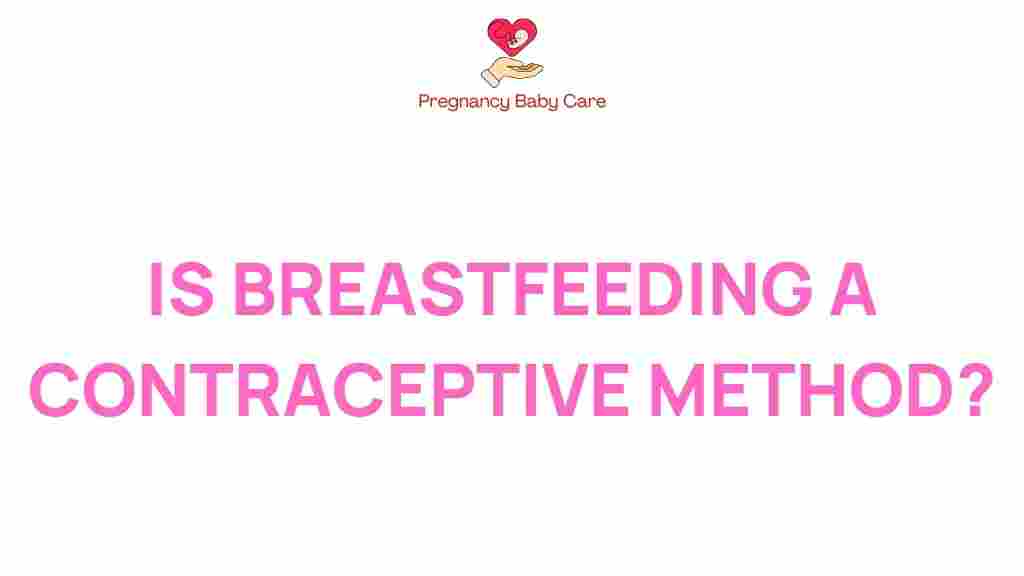Is Breastfeeding the Secret Contraceptive Method You Need?
Breastfeeding is often celebrated for its numerous benefits for both mothers and babies. One of the lesser-known advantages of breastfeeding is its potential role in contraception during the postpartum period. As families grow and individuals plan for their futures, understanding the connection between breastfeeding, fertility, and family planning becomes essential. This article explores how breastfeeding can serve as a natural contraceptive method through lactational amenorrhea, the importance of reproductive health, and practical tips for utilizing breastfeeding as a form of birth control.
Understanding Lactational Amenorrhea
Lactational amenorrhea is a natural form of contraception that can occur in breastfeeding mothers. It refers to the absence of menstruation during the postpartum period while breastfeeding. This phenomenon is primarily attributed to hormonal changes that suppress ovulation. Here are some key points about lactational amenorrhea:
- Hormonal Changes: Prolactin, the hormone responsible for milk production, inhibits the release of gonadotropin-releasing hormone (GnRH), which is crucial for ovulation.
- Duration: Lactational amenorrhea is most effective in the first six months postpartum, especially if the mother is exclusively breastfeeding.
- Exclusivity: The likelihood of ovulation increases if breastfeeding is supplemented with formula or solid foods.
For many mothers, this natural contraceptive method can be an appealing option during the early months of parenting. However, it is essential to understand how to maximize its effectiveness.
How to Use Breastfeeding as Contraception
Utilizing breastfeeding as a form of birth control requires adherence to specific guidelines. Here’s a step-by-step process to ensure its effectiveness:
- Exclusively Breastfeed: For optimal results, breastfeed exclusively without supplementation for at least the first six months. This means no formula, water, or solid foods.
- Nurse Frequently: Aim to breastfeed at least every 2-3 hours during the day and every 4 hours at night. Frequent nursing helps maintain high levels of prolactin.
- Monitor Menstrual Cycle: Keep track of any signs of menstruation. Return of menstrual cycles may indicate the return of fertility.
- Limit Supplementation: The introduction of other foods or formula can decrease the effectiveness of lactational amenorrhea as a contraceptive method.
Factors Influencing Effectiveness
While breastfeeding can be an effective contraceptive method, several factors can influence its efficacy:
- Individual Variability: Each woman’s body is different. Some may resume ovulation earlier than others, even while breastfeeding exclusively.
- Age of the Baby: The risk of ovulation increases as the baby grows and begins to consume other foods.
- Frequency of Nursing: Infrequent nursing sessions can lead to lower prolactin levels and a higher chance of ovulation.
Understanding these factors can help mothers make informed decisions about their reproductive health during the postpartum period.
Potential Challenges and Troubleshooting
While breastfeeding is a natural contraceptive method, it is not without its challenges. Here are some common issues and tips for troubleshooting:
- Returning Menstruation: If menstruation resumes before the six-month mark, consider consulting with a healthcare provider for further contraceptive options.
- Inconsistent Nursing Schedule: Establish a routine that encourages frequent breastfeeding sessions to maintain effective levels of prolactin.
- Supplementing with Formula: If supplementation is necessary, discuss alternative contraceptive methods with your healthcare provider.
If any concerns arise regarding reproductive health or breastfeeding, it is crucial to seek support from healthcare professionals or lactation consultants.
Other Birth Control Options Postpartum
While breastfeeding can provide a natural form of contraception, it is essential for mothers to be aware of other birth control options available post-delivery. Some of these include:
- Barrier Methods: Condoms and diaphragms are safe to use during breastfeeding and do not affect milk supply.
- Hormonal Contraceptives: Certain hormonal birth control methods, such as the mini-pill, can be used while breastfeeding, typically after the first six weeks postpartum.
- IUDs: Intrauterine devices are highly effective and can be inserted after childbirth, depending on individual circumstances.
Discussing these options with a healthcare provider can help mothers choose the best method that aligns with their family planning goals.
Maintaining Reproductive Health
Reproductive health is an essential aspect of overall well-being, especially during the postpartum period. Here are some tips to maintain good reproductive health while breastfeeding:
- Regular Check-Ups: Schedule postpartum visits to monitor your health and discuss any concerns related to fertility and contraception.
- Healthy Lifestyle: Maintain a balanced diet, exercise regularly, and manage stress to support overall health and hormonal balance.
- Stay Informed: Keep abreast of the latest research and recommendations regarding breastfeeding and contraception.
For more information on reproductive health and family planning, you can visit this resource.
Conclusion
In summary, breastfeeding can serve as a natural contraceptive method through lactational amenorrhea during the postpartum period. By understanding the principles of breastfeeding and its impact on fertility, mothers can effectively manage their reproductive health and family planning. While breastfeeding can provide a temporary form of birth control, it is essential to recognize its limitations and explore other contraceptive options as necessary. Always consult with healthcare professionals to tailor a family planning strategy that fits your individual needs.
As you navigate the beautiful yet challenging journey of motherhood, remember that knowledge is power—especially when it comes to your reproductive health.
This article is in the category Health and created by PregnancyBabyCare Team
